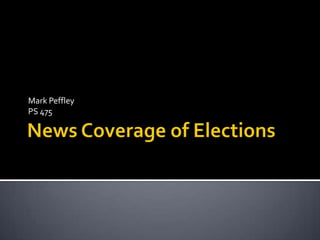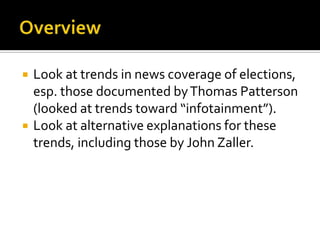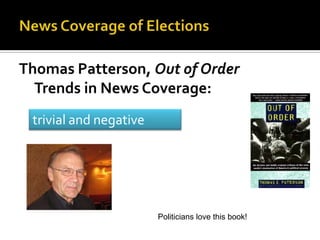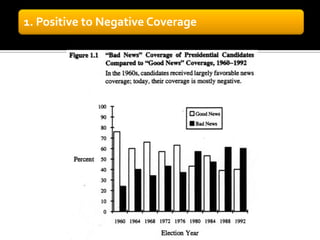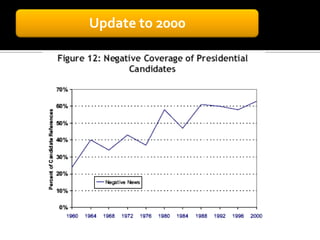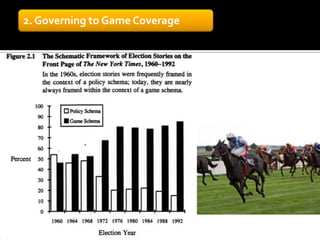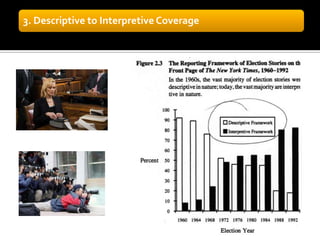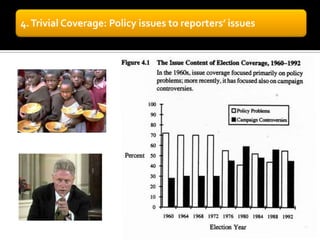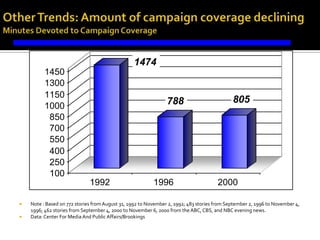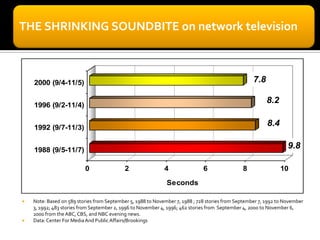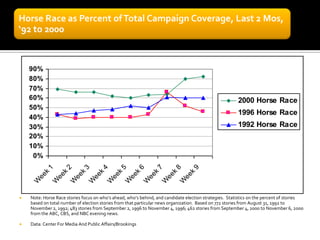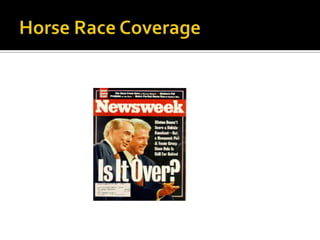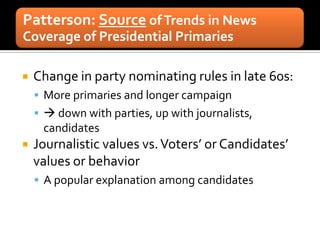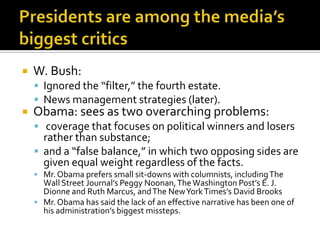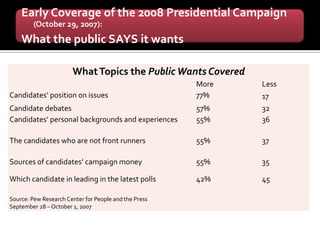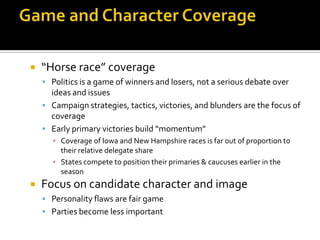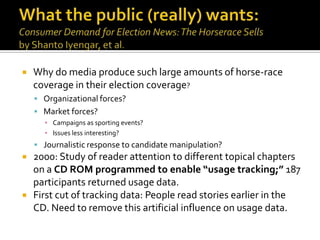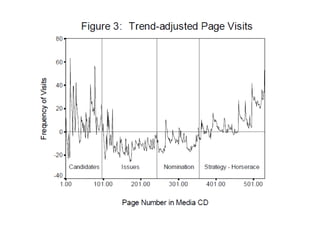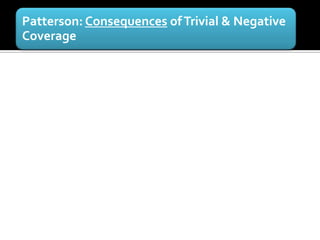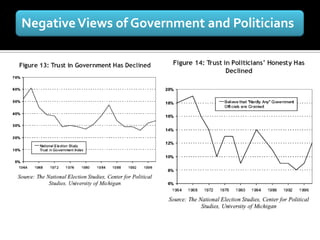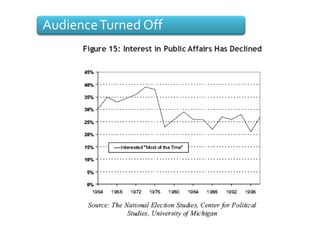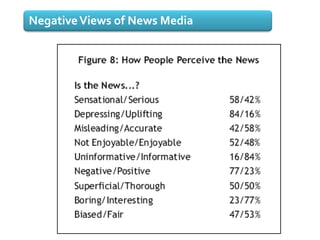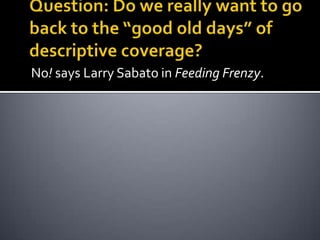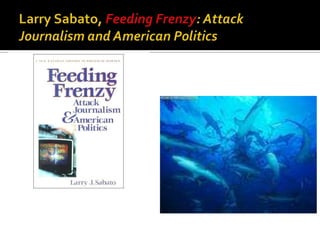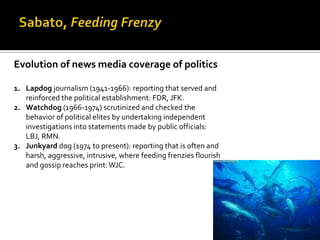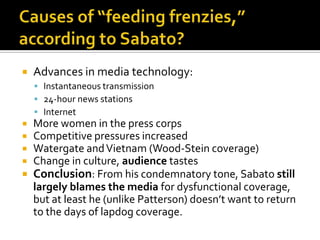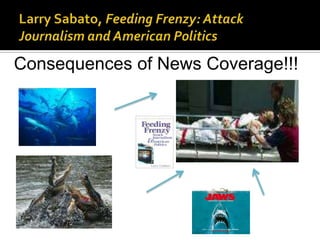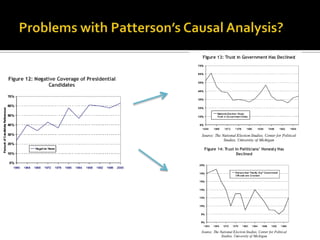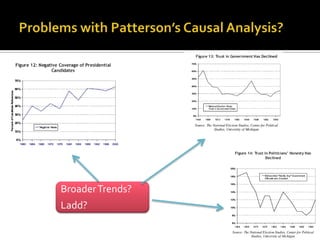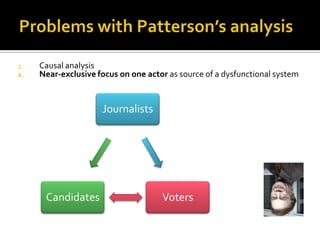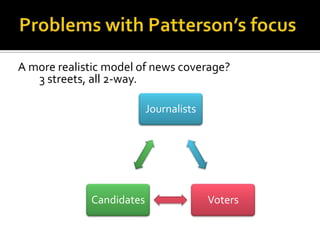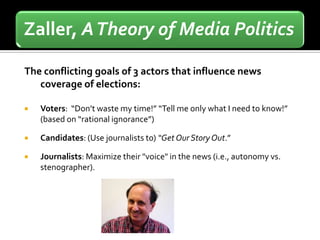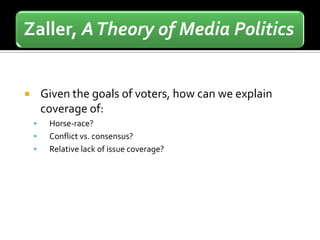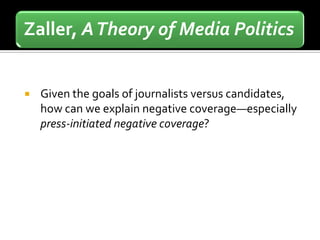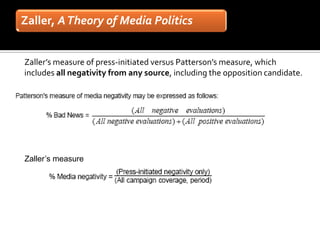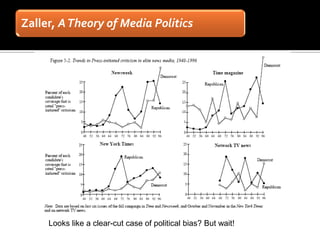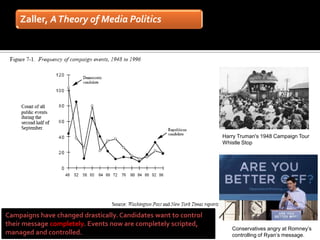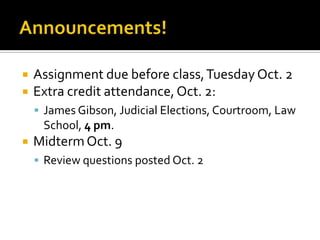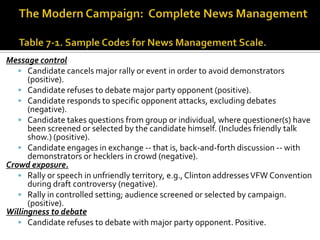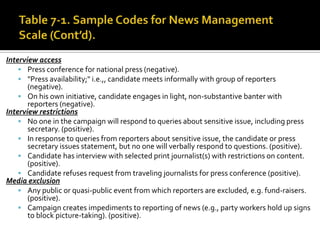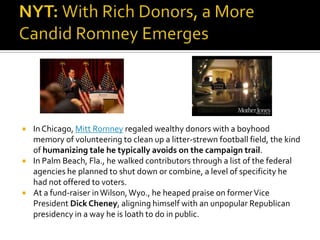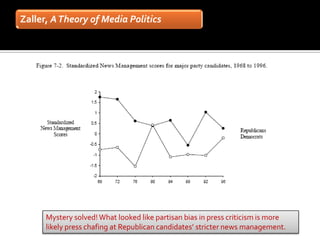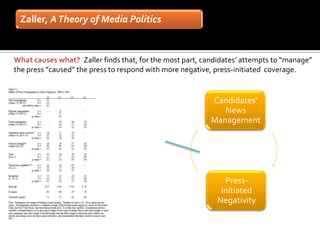475 news coverage of elections 2012 up
- 2. ïĄ Look at trends in news coverage of elections, esp. those documented by Thomas Patterson (looked at trends toward âinfotainmentâ). ïĄ Look at alternative explanations for these trends, including those by John Zaller.
- 3. trivial and negative Politicians love this book!
- 4. 1. Positive to Negative Coverage
- 6. 2. Governing to Game Coverage
- 7. 3. Descriptive to Interpretive Coverage
- 8. 4. Trivial Coverage: Policy issues to reportersâ issues
- 9. 1474 1450 1300 1150 788 805 1000 850 700 550 400 250 100 1992 1996 2000 ïĄ Note : Based on 772 stories from August 31, 1992 to November 2, 1992; 483 stories from September 2, 1996 to November 4, 1996; 462 stories from September 4, 2000 to November 6, 2000 from the ABC, CBS, and NBC evening news. ïĄ Data: Center For Media And Public Affairs/Brookings
- 10. THE SHRINKING SOUNDBITE on network television 2000 (9/4-11/5) 7.8 1996 (9/2-11/4) 8.2 1992 (9/7-11/3) 8.4 1988 (9/5-11/7) 9.8 0 2 4 6 8 10 Seconds ïĄ Note: Based on 589 stories from September 5, 1988 to November 7, 1988 ; 728 stories from September 7, 1992 to November 3, 1992; 483 stories from September 2, 1996 to November 4, 1996; 462 stories from September 4, 2000 to November 6, 2000 from the ABC, CBS, and NBC evening news. ïĄ Data: Center For Media And Public Affairs/Brookings
- 11. Horse Race as Percent of Total Campaign Coverage, Last 2 Mos, â92 to 2000 90% 80% 70% 60% 2000 Horse Race 50% 1996 Horse Race 40% 30% 1992 Horse Race 20% 10% 0% 1 2 3 4 5 6 7 8 9 k k k k k k k k k ee ee ee ee ee ee ee ee ee W W W W W W W W W ïĄ Note: Horse Race stories focus on whoâs ahead, whoâs behind, and candidate election strategies. Statistics on the percent of stories based on total number of election stories from that particular news organization. Based on 772 stories from August 31, 1992 to November 2, 1992; 483 stories from September 2, 1996 to November 4, 1996; 462 stories from September 4, 2000 to November 6, 2000 from the ABC, CBS, and NBC evening news. ïĄ Data: Center For Media And Public Affairs/Brookings
- 13. Patterson: Source of Trends in News Coverage of Presidential Primaries ïĄ Change in party nominating rules in late 60s: ï§ More primaries and longer campaign ï§ ï down with parties, up with journalists, candidates ïĄ Journalistic values vs. Votersâ or Candidatesâ values or behavior ï§ A popular explanation among candidates
- 14. ïĄ W. Bush: ï§ Ignored the âfilter,â the fourth estate. ï§ News management strategies (later). ïĄ Obama: sees as two overarching problems: ï§ coverage that focuses on political winners and losers rather than substance; ï§ and a âfalse balance,â in which two opposing sides are given equal weight regardless of the facts. ï§ Mr. Obama prefers small sit-downs with columnists, including The Wall Street Journalâs Peggy Noonan, The Washington Postâs E. J. Dionne and Ruth Marcus, and The New York Timesâs David Brooks ï§ Mr. Obama has said the lack of an effective narrative has been one of his administrationâs biggest missteps.
- 15. Early Coverage of the 2008 Presidential Campaign (October 29, 2007): What the public SAYS it wants What Topics the Public Wants Covered More Less Candidatesâ position on issues 77% 17 Candidate debates 57% 32 Candidatesâ personal backgrounds and experiences 55% 36 The candidates who are not front runners 55% 37 Sources of candidatesâ campaign money 55% 35 Which candidate in leading in the latest polls 42% 45 Source: Pew Research Center for People and the Press September 28 â October 1, 2007
- 16. ïĄ âHorse raceâ coverage ï§ Politics is a game of winners and losers, not a serious debate over ideas and issues ï§ Campaign strategies, tactics, victories, and blunders are the focus of coverage ï§ Early primary victories build âmomentumâ ⊠Coverage of Iowa and New Hampshire races is far out of proportion to their relative delegate share ⊠States compete to position their primaries & caucuses earlier in the season ïĄ Focus on candidate character and image ï§ Personality flaws are fair game ï§ Parties become less important
- 17. ïĄ Why do media produce such large amounts of horse-race coverage in their election coverage? ï§ Organizational forces? ï§ Market forces? ⊠Campaigns as sporting events? ⊠Issues less interesting? ï§ Journalistic response to candidate manipulation? ïĄ 2000: Study of reader attention to different topical chapters on a CD ROM programmed to enable âusage tracking;â 187 participants returned usage data. ïĄ First cut of tracking data: People read stories earlier in the CD. Need to remove this artificial influence on usage data.
- 19. Patterson: Consequences of Trivial & Negative Coverage
- 20. Negative Views of Government and Politicians
- 22. Negative Views of News Media
- 23. No! says Larry Sabato in Feeding Frenzy.
- 25. Evolution of news media coverage of politics 1. Lapdog journalism (1941-1966): reporting that served and reinforced the political establishment: FDR, JFK. 2. Watchdog (1966-1974) scrutinized and checked the behavior of political elites by undertaking independent investigations into statements made by public officials: LBJ, RMN. 3. Junkyard dog (1974 to present): reporting that is often and harsh, aggressive, intrusive, where feeding frenzies flourish and gossip reaches print: WJC.
- 26. ïĄ Advances in media technology: ï§ Instantaneous transmission ï§ 24-hour news stations ï§ Internet ïĄ More women in the press corps ïĄ Competitive pressures increased ïĄ Watergate and Vietnam (Wood-Stein coverage) ïĄ Change in culture, audience tastes ïĄ Conclusion: From his condemnatory tone, Sabato still largely blames the media for dysfunctional coverage, but at least he (unlike Patterson) doesnât want to return to the days of lapdog coverage.
- 27. Consequences of News Coverage!!!
- 30. 1. Causal analysis 2. Near-exclusive focus on one actor as source of a dysfunctional system Journalists Candidates Voters
- 31. A more realistic model of news coverage? 3 streets, all 2-way. Journalists Candidates Voters
- 32. Zaller, A Theory of Media Politics The conflicting goals of 3 actors that influence news coverage of elections: ïĄ Voters: âDonât waste my time!â âTell me only what I need to know!â (based on ârational ignoranceâ) ïĄ Candidates: (Use journalists to) âGet Our Story Out.â ïĄ Journalists: Maximize their "voice" in the news (i.e., autonomy vs. stenographer).
- 33. Zaller, A Theory of Media Politics ïĄ Given the goals of voters, how can we explain coverage of: ï§ Horse-race? ï§ Conflict vs. consensus? ï§ Relative lack of issue coverage?
- 34. Zaller, A Theory of Media Politics ïĄ Given the goals of journalists versus candidates, how can we explain negative coverageâespecially press-initiated negative coverage?
- 35. Zaller, A Theory of Media Politics Zallerâs measure of press-initiated versus Pattersonâs measure, which includes all negativity from any source, including the opposition candidate. Zallerâs measure
- 36. Zaller, A Theory of Media Politics Looks like a clear-cut case of political bias? But wait!
- 37. Zaller, A Theory of Media Politics Harry Truman's 1948 Campaign Tour Whistle Stop Campaigns have changed drastically. Candidates want to control their message completely. Events now are completely scripted, Conservatives angry at Romneyâs managed and controlled. controlling of Ryanâs message.
- 38. ïĄ Assignment due before class, Tuesday Oct. 2 ïĄ Extra credit attendance, Oct. 2: ï§ James Gibson, Judicial Elections, Courtroom, Law School, 4 pm. ïĄ Midterm Oct. 9 ï§ Review questions posted Oct. 2
- 39. Message control ï§ Candidate cancels major rally or event in order to avoid demonstrators (positive). ï§ Candidate refuses to debate major party opponent (positive). ï§ Candidate responds to specific opponent attacks, excluding debates (negative). ï§ Candidate takes questions from group or individual, where questioner(s) have been screened or selected by the candidate himself. (Includes friendly talk show.) (positive). ï§ Candidate engages in exchange -- that is, back-and-forth discussion -- with demonstrators or hecklers in crowd (negative). Crowd exposure. ï§ Rally or speech in unfriendly territory, e.g., Clinton addresses VFW Convention during draft controversy (negative). ï§ Rally in controlled setting; audience screened or selected by campaign. (positive). Willingness to debate ï§ Candidate refuses to debate with major party opponent. Positive.
- 40. Interview access ï§ Press conference for national press (negative). ï§ "Press availability;" i.e.,, candidate meets informally with group of reporters (negative). ï§ On his own initiative, candidate engages in light, non-substantive banter with reporters (negative). Interview restrictions ï§ No one in the campaign will respond to queries about sensitive issue, including press secretary. (positive). ï§ In response to queries from reporters about sensitive issue, the candidate or press secretary issues statement, but no one will verbally respond to questions. (positive). ï§ Candidate has interview with selected print journalist(s) with restrictions on content. (positive). ï§ Candidate refuses request from traveling journalists for press conference (positive). Media exclusion ï§ Any public or quasi-public event from which reporters are excluded, e.g. fund-raisers. (positive). ï§ Campaign creates impediments to reporting of news (e.g., party workers hold up signs to block picture-taking). (positive).
- 41. ïĄ In Chicago, Mitt Romney regaled wealthy donors with a boyhood memory of volunteering to clean up a litter-strewn football field, the kind of humanizing tale he typically avoids on the campaign trail. ïĄ In Palm Beach, Fla., he walked contributors through a list of the federal agencies he planned to shut down or combine, a level of specificity he had not offered to voters. ïĄ At a fund-raiser in Wilson, Wyo., he heaped praise on former Vice President Dick Cheney, aligning himself with an unpopular Republican presidency in a way he is loath to do in public.
- 42. Zaller, A Theory of Media Politics Mystery solved! What looked like partisan bias in press criticism is more likely press chafing at Republican candidatesâ stricter news management.
- 43. Zaller, A Theory of Media Politics What causes what? Zaller finds that, for the most part, candidatesâ attempts to âmanageâ the press âcausedâ the press to respond with more negative, press-initiated coverage. Candidatesâ News Management Press- Initiated Negativity
